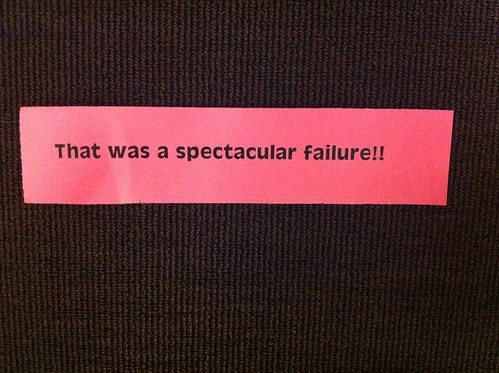
On Monday, I attended Compasspoint’s Nonprofit Day 2011. The theme was “Inspired Resilience: How we sustain People, Organizations, and Causes.” I attended a fantastic workshop facilitated by Michelle Gislason, Senior Project Director, CompassPoint, called “How to Fail Spectacularly (and What You Can Learn from It)” Here’s a few key takeaways and resources.
- There are two different views about failure that people in the room who work for nonprofits have – one positive and one negative. The negatives include: shame, embarrassment, and guilt. The positives: learning, opportunity, and improvement. The big point is that failure is a not a bad thing if you can reap from insight and learning from it.
- The process of learning begins with you can admit failure, avoid the stigma – either the voice inside your or if working with a team not to play the blame game – but to reflect on why it happened. This leads to deeper insights and improvements of what you’re doing. Michelle shared a story about project she was managing that failed and the insights that it generated. It was a particularly powerful story because it involved being honest with a funder who had supported the failed project.
- Failure happens for a lot of reasons – these can include unrealistic expectations, not having a strategy or plan, not doing due diligence or research, or mission creep driven by funding. These can provide ripe learning experiences. There is also “intentional failure” – that is a form of risk-taking that leads to innovation. Often, these may lead to incremental success or dramatic success, but if you don’t take these risks you won’t ever see innovation. She was not talking about careless failure – but trying something new – as a pilot – and learning from it. This takes an agile, learning culture.
- The topic is a hot right now with a couple of recent books and articles. (I’ve been curating a list on failure and have them here) Two really good resources: A new book called “Why Success Always Begins With Failure” by Tim Hartford. Here’s a post that gives you tip on how to fail in the right way and reap the benefits based on the book. There is a nonprofit site called “Admitting Failure” that was created by the NGO Engineers Without Borders to avoid having mistakes replicated.
- We did an exercise in small groups where we reflected on a failure and share it with others. The exercise is based on failfare. It was a simple set of questions that can be used to debrief any project and gain insights. Some nonprofits have instituted their own internal fail fest – like DoSomething.Org
What was the project?
What were you trying to do?
What was the fail? Where did it go wrong?
What would you do differently?
What would you never do again?
What lessons can be learned?
- The workshop included some profound and inspirational quotes about failure as well as a humorous play list of songs on the theme of mistakes.
How does your organization deal with mistakes and failure? Blame game or learning?
